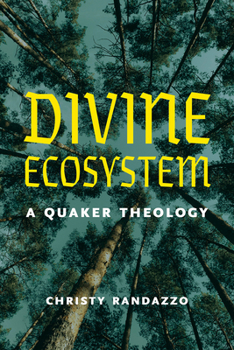Divine Ecosystem: A Quaker Theology
In this book, Randazzo develops new language to "translate" Quaker theological concepts which are rooted in the foundation of the tradition. Quaker theology has, since its beginnings, relied heavily on metaphors of Divine/human interdependence, and particularly creation metaphors related to the foundational concept of all Quaker theology: "that of God within." Coupled with this inherent ecological focus rooted deep within the tradition is the peculiarly Quaker practice of journals - the vitally important practice of Quakers reflecting upon their own personal experiencesin light of their theological import. Randazzo's theological narrative of liberal Quakerism creates clarity and structure without compromising the capacious breadth and depth of this distinctive tradition.
Reflecting the traditional use of creation metaphors to express Quaker theological concepts, Randazzo proposes a new metaphor of "ecosystem" - new because the term was first used in 1935 - to explain the interplay of the old threads underlying Quaker theology. In so doing, Randazzo helps readers understand the hope-filled richness of Quaker theology while offering space for the myriad ways Friends experience the sacred. The "sources" of Quaker theology work as a complex ecosystem of overlapping elements, where none is primary but all interact with each other in inexplicable and unexpected ways: the individual and communal experience of the Divine, the testimony of the practices which demonstrate the truth of this experience in the values and practices of the community, Quaker interpretation of Divine revelation in both sacred stories as well as new ideas and concepts which evolve over time, and the doctrines which emerge as Quakers explore the way that these elements all intersect in the lives and stories of our communities.





